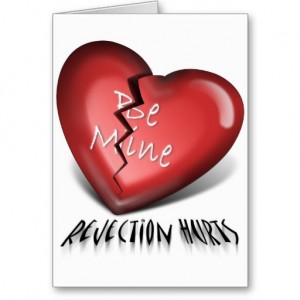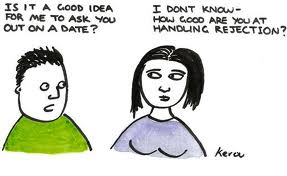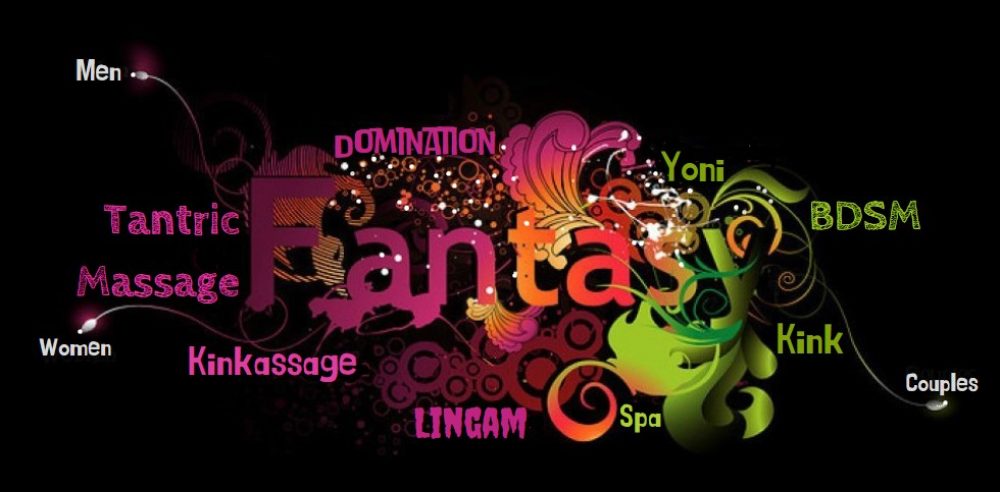How rejections damage our psychological and emotional well-being.
Published on July 3, 2013 by Guy Winch, Ph.D. in The Squeaky Wheel
 Rejection really hurts but most rejections inflict damage to our psychological well-being that goes way beyond mere emotional pain. Here are ten lesser known facts that describe the various psychological impacts rejections have on our emotions, thinking, and behavior. Let’s begin by examining why rejection hurts as much as it does.
Rejection really hurts but most rejections inflict damage to our psychological well-being that goes way beyond mere emotional pain. Here are ten lesser known facts that describe the various psychological impacts rejections have on our emotions, thinking, and behavior. Let’s begin by examining why rejection hurts as much as it does.
.
1. Rejection piggybacks on physical pain pathways in the brain: fMRI studies show that the same areas of the brain become activated when we experience rejection as when we experience physical pain. This is why rejection hurts so much (neurologically speaking). In fact our brains respond so similarly to rejection and physical pain that:
2. Tylenol reduces the emotional pain rejection elicits. To test the hypothesis that rejection mimics physical pain, scientists gave some people Tylenol (acetaminophen) before asking them to recall a painful rejection experience. Participants who received Tylenol reported significantly less emotional pain than subjects who received a sugar pill. Psychologists assume there is a specific reason for the strong link between rejection and physical pain.
3. Rejection served a vital function in our evolutionary past. In our hunter gatherer past, being ostracized from our tribes was akin to a death sentence, as we were unlikely to survive for long alone. Evolutionary psychologists assume the brain developed an early warning system to alert us when we were at risk for ostracism. Because it was so important to get our attention—those who experienced rejection as more painful (i.e., because rejection mimicked physical pain in their brain) gained an evolutionary advantage—they were more likely to correct their behavior and consequently, more likely to remain in the tribe. Which probably also explains why:
4. We can relive and re-experience social pain more vividly than we can physical pain. Try recalling an experience in which you felt significant physical pain and your brain pathways will go, ‘meh’. In other words, the memory alone won’t elicit physical pain. But try reliving a painful rejection (actually, don’t—just take my word for it), and you will be flooded with many of the same feelings you had at the time (and your brain will respond much as it did at the time too). Our brain prioritizes rejection experiences because we are social animals who live in ‘tribes’. This leads to the next aspect about rejection we often overlook:
5. Rejection destabilizes our ‘Need to Belong’. We all have a fundamental need to belong to a group (or tribe). When we get rejected, this need becomes destabilized and the disconnection we feel adds to our emotional pain. Reconnecting with those who love us, reaching out to members of groups to which we feel strong affinity and who value us and accept us, has been found to soothe emotional pain after a rejection. Feeling alone and disconnected after a rejection has another often overlooked impact, this time, on our behavior:
6. Rejection creates surges of anger and aggression. In 2001, the Surgeon General of the U.S. issued a report that stated rejection was a greater risk for adolescent violence than drugs, poverty, or gang membership. Countless studies have demonstrated that even mild rejections lead people to take out their aggression on ‘innocent’ bystanders. School shootings, violence against women, and fired postal workers going…postal, are other examples of the strong link between rejection and aggression. However, much of the aggression rejection elicits is also turned inward:
 7. Rejections send us on a mission to seek and destroy our self-esteem. We often respond to romantic rejections by finding fault in ourselves, bemoaning all our inadequacies, kicking ourselves when we’re already down, and smacking our self-esteem into a pulp. Most romantic rejections are a matter of poor fit and a lack of chemistry, incompatible lifestyles or wanting different things at different times and other such mutual dynamics. Blaming ourselves and attacking our self-worth only deepens the emotional pain we feel and makes it harder for us to recover emotionally. But before you rush to blame yourself for blaming yourself, consider that you might not be thinking clearly in those moments:
7. Rejections send us on a mission to seek and destroy our self-esteem. We often respond to romantic rejections by finding fault in ourselves, bemoaning all our inadequacies, kicking ourselves when we’re already down, and smacking our self-esteem into a pulp. Most romantic rejections are a matter of poor fit and a lack of chemistry, incompatible lifestyles or wanting different things at different times and other such mutual dynamics. Blaming ourselves and attacking our self-worth only deepens the emotional pain we feel and makes it harder for us to recover emotionally. But before you rush to blame yourself for blaming yourself, consider that you might not be thinking clearly in those moments:
8. Rejection temporarily lowers our IQ. Being asked to recall a recent rejection experience and relive the experience was enough for people to score significantly lower on subsequent IQ tests, tests of short-term memory, and tests of decision making. Indeed, when we are reeling from a painful rejection, thinking clearly is not that easy. This explains why:
9. Rejection does not respond to reason. Participants were put through an experiment in which they were rejected by strangers. However the experiment was rigged—the strangers were confederates. Surprisingly, being told the ‘strangers’ did not actually reject them did little to ease the emotional pain they felt. Even being told the strangers belonged to a group they despised such as the KKK did little to soothe their hurt feelings. But not all the news is bad because:
10. There are ways to treat the psychological wounds rejection inflicts. It is possible to treat the emotional pain rejection elicits and to prevent the psychological, emotional, cognitive, and relationship fallouts that occur in its aftermath. To do so effectively we must address each of our psychological wounds (i.e., soothe our emotional pain, reduce our anger and aggression, protect our self-esteem, and stabilize our need to belong).
For more about treating the psychological wounds rejection inflicts, check out my new book, Emotional First Aid: Practical Strategies for Treating Failure, Rejection, Guilt, and Other Everyday Psychological Injuries (Hudson Street Press, 2013).
Click here to join my mailing list and receive an exclusive gift: How to Recover from Rejection
You might also like: Ten Signs You Might Have a Fear of Failure
Copyright 2013 Guy Winch





